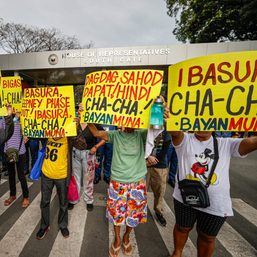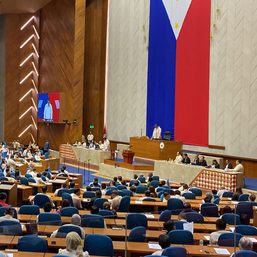SUMMARY
This is AI generated summarization, which may have errors. For context, always refer to the full article.
![[OPINION] Reviving the study of the Philippine Constitution in higher education](https://www.rappler.com/tachyon/2023/03/IMHO-teaching-constitution-April-1-2023.jpg)
Within the backdrop of bureaucratic militarization and a highly punitive regime, talks to revive mandatory Reserve Officers’ Training Corps (ROTC) have reemerged. Proponents argue that the ROTC will be impactful in inculcating discipline and nationalism among young Filipinos. There have been several studies and accounts of the ineffectiveness of ROTC and how it instead nurtures violence, corruption, and uncritical reverence for authority.
I propose the integration of human rights discourse in higher education as a more compelling and urgent alternative.
Existing policies in the Philippines have stipulated the integration of human rights into formal education, but the implementation has been sparse. The potential of strengthening the study of the Constitution in increasing awareness and consciousness of democratic values, human rights, and social justice warrants exploration.
The fundamental law (Art. XIV, Sec. 3) requires the study of the Philippine Constitution in all educational institutions. For decades, a Constitution subject was part of the curriculum of any college student in the Philippines ― whether one aspires to be an architect, engineer, nurse, or teacher. Regardless of the nature of their degrees, students were taught about the highest law. This changed since the implementation of many education reforms in the country, including K-12, where the teaching of the Constitution was relegated to secondary education and embedded in a much broader subject on politics and history.
While this may seem like a sheer administrative move of unloading curricular load at the tertiary level, there may be more worrying consequences. The current practice has made the teaching and study of the Constitution diluted, as there are other equally integral topics that need to be covered. There are also instances where the subject is only taught to HUMSS students, not to all tracks in Senior High School. The weak social science education in the country also gives an insight on its quality.
Learning about the Constitution is a crucial space to build an understanding of how the state works, what its powers are, and more importantly, the limits to such powers. The Constitution lays down citizen-state relations and the interactions between duty-bearers and rights-holders. A vital element in teaching the Constitution is the Bill of Rights, where young learners gain knowledge on their human rights as well as those liberties guaranteed by the fundamental law. This is also an avenue for them to reflect on their citizenship vis-a-vis institutions that wield power over their personal and public lives.
The Constitution may serve as a potent framework for human rights education. It contains provisions and guarantees for individual and collective development in politics, society, culture, and the economy. Studying the Constitution provides a concrete space for young people to learn about their rights so they can claim them more deliberately. Under the doctrine of incorporation, the international human rights regime and global governance can also be introduced to students. This helps them appreciate the context and dynamics of human rights promotion and protection in the national, regional, and international domains. The constitutional recognition of civil society and various sectors (e.g. youth, women, indigenous peoples) in Philippine society also facilitates reflection on the roles they play in nation-building and human rights promotion.
Arendt’s reminder that individuals have to claim their rights, and not just rely on their supposed universality, necessitates that individuals are capacitated to do so. Rights can be protected because they are claimed. How can Filipinos, especially young Filipinos, effectively assert their rights if the spaces to learn about them are not adequate, if not available? The deliberative and protest schools of thought in the human rights field hold quite optimistic views on the utility of legal instruments in human rights protection. The presence of statutes and laws, however, cannot assure compliance. This requires a much more complex and arduous task ― constant and consistent awareness-raising and advocacy to hone a culture that promotes the values and principles of human rights and democracy.
The need to teach and study the Constitution in higher education is even more pronounced in the context of a severely challenged state of democracy and human rights in the country. Where the exercise of political and civil rights faces repression and violence by the state, it is imperative to ensure that citizens have a strong and grounded grasp of their fundamental rights. Toxic polarization has also been prevalent in the country’s politics. A shift away from partisan politics to issue-based politics is direly needed. Politicians who have hijacked democratic processes and institutions still enjoy legitimacy. These realities certainly cannot be solely attributed to the lack of rights education but the latter may help mitigate them.
Human rights as a lens in encouraging active citizenship, deliberating policies, and ultimately engaging in politics and governance is an opportunity that must be created and embraced by higher education institutions.
Reviving the study of the Constitution at the tertiary level also means a re-examination of how the Constitution is taught. With the endless opportunities of new media and the corresponding threats of disinformation, it is crucial to ensure that the approach and pedagogy are informed by context. The Constitution must be taught according to its history as well as its aspirations. Practical ICT tools and skills can be integrated to aid students in navigating online (and offline) information sources and algorithm politics. Collaboration among stakeholders from the academe, government, and civil society is a major step in making sure that support mechanisms and resources are available and appropriate for this effort.
The struggle for human rights and democracy is not an easy one, but we do have available instruments at our disposal. The Constitution is one powerful tool for human rights and greater political education. Learning about how government functions and what citizens are entitled to and can do should not only be a concern during elections. Education must be geared toward social consciousness and social change.
Where history is distorted for private gain, where injustice and impunity persist, we must maximize every chance and every space to assert our rights while we can; take back the power that the Filipino people hold ― as rightfully espoused in our highest law. The Constitution, after all, is not a document that is meant to be left unread in grand chambers. It is meant to be translated into the lives of the people, especially the young, so they will not only be effective professionals but Filipino citizens, first and foremost. – Rappler.com
Kay Conales is a student of the MA Human Rights and Democratization program of the Institute of Human Rights and Peace Studies of Mahidol University (Thailand) and the Faculty of Social and Political Sciences at Universitas Gadjah Mada (Indonesia). She is also a learning facilitator in political science at the University of San Carlos (Philippines).
Add a comment
How does this make you feel?
![[OPINION] A proposal for mandatory constitutional subjects in PMA, PNPA](https://www.rappler.com/tachyon/2023/01/20230112-mandatory-constitutional-subjects.jpg?fit=449%2C449)
![[In This Economy] Economic charter change is very unpopular – it’s time lawmakers listened](https://www.rappler.com/tachyon/2024/04/in-this-economy-charterchange.jpg?resize=257%2C257&crop=292px%2C0px%2C720px%2C720px)

![[OPINION] The First Mode conundrum](https://www.rappler.com/tachyon/2024/03/tl-first-mode-conundrum-03232024.jpg?resize=257%2C257&crop=283px%2C0px%2C720px%2C720px)
![[ANALYSIS] Understanding the demonization of foreign capital](https://www.rappler.com/tachyon/2024/03/foreign-capital-mar-5-2024.jpg?resize=257%2C257&crop=274px%2C0px%2C720px%2C720px)

There are no comments yet. Add your comment to start the conversation.